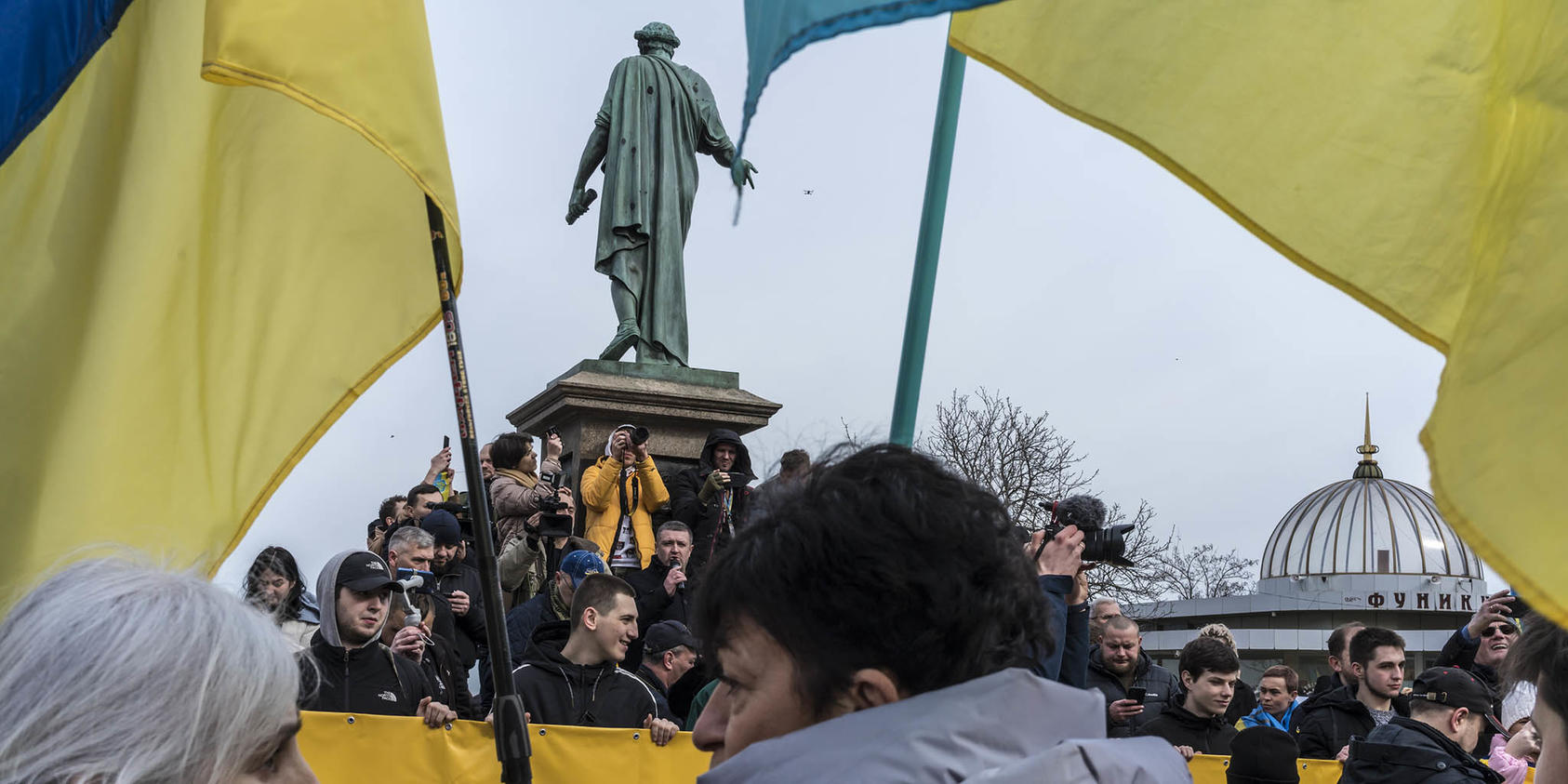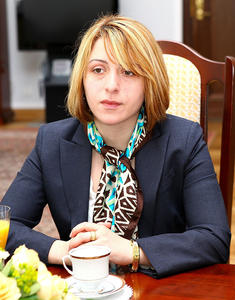Ukraine: How to Oppose Russia’s Weaponization of Corruption
An expert urges democracies to target ‘strategic corruption’ that undermines governance, stability.
Fifteen weeks of Ukrainians’ staunch resistance to Russia’s invasion has created an opportunity to weaken one of Russia’s main weapons to undermine democracy and stability in other countries, according to Eka Tkeshelashvili, a former foreign minister of Georgia. As democracies bolster Ukraine’s defense, they also should step up support for Ukraine to root out the corruption in business and government that has long been Russian President Vladimir Putin’s primary method to cripple the independence of Russia’s neighbors. One impact of the war will be to create a stronger political base for throttling corruption in Ukraine, Tkeshelashvili said.

Tkeshelashvili, a career lawyer who also served as Georgia’s justice minister, has worked on Ukrainian anti-corruption projects with Ukraine’s government, the European Union and now the U.S. Agency for International Development (USAID). For Putin, who has lamented Russia’s loss of control over the 14 other nations of the former Soviet Union, a preferred method for restoring that dominance has been “strategic corruption,” she noted in an interview. In Georgia, Ukraine and other countries, she said, Putin’s 22-year regime has pursued this goal the way it has built authoritarian power at home, using business monopolies and secret funding to knit networks of corrupt business magnates who help shift those nations’ policies to the Kremlin’s liking.
“The very fact that Russia had to resort to” military invasions of Ukraine in 2014 and more massively this year “is testament to the fact that Ukraine had the capacity to resist” the Kremlin’s efforts to control the country through corrupt officials and business, Tkeshelashvili said. The significant, if still incomplete, reforms that were compelled in Ukraine by its grassroots pro-democracy movements were enough to disrupt Putin’s control-via-corruption strategy and sustain Ukraine’s movement toward a Europe-oriented democracy, she said.
Notably since a prominent 2020 Foreign Affairs article by four former U.S. officials, scholars and policymakers have warned that strategic corruption — notably, but not exclusively, by Russia and China — poses new threats to democracies and a rules-based international order. Where practitioners of garden-variety corruption have forever sought wealth and gilded lifestyles, strategic corruption is governments’ weaponization of the same tactics — bribery, graft, kickbacks and the like — to destabilize rival states and furtively reap foreign policy advantage.
The U.S. government last year declared corruption a “core national security interest” — and issued a strategy to counter it. Given corruption’s threats to stability, including efforts to build peace in places facing violent conflict, the U.S. Institute of Peace is pursuing a joint study with USAID on the ways that elites in violence-afflicted states corrupt military, police or other security institutions, and how U.S. policies can better prevent it. The study, to be published this fall, shows how corrupt elites won persistent influence over Ukraine’s judicial system. Over years, Ukrainians responded by establishing national anti-corruption agencies and a special anti-corruption court — and Putin cited those bodies’ existence as part of his justification for invading Ukraine in February.
Across many post-Soviet states, corruption has fueled public frustration and turmoil, helping drive grassroots protests in Ukraine and Belarus that pro-Russian governments suppressed violently. Similar protest and upheaval in January killed more than 200 people in Kazakhstan. Strategic corruption often exploits and exacerbates violent conflict, as Russia has done in countries as distant as the Central African Republic and Mali. China also makes broad use of strategic corruption — as Turkey, Azerbaijan, Kazakhstan and others do at smaller scales, according to analysts.
The surge of global revulsion at Putin’s brutal assault on Ukraine is consolidating public opinion and political will — in Ukraine, Europe and other democracies — that policymakers can build on to advance Ukrainians’ years-long democratization and anti-corruption campaigns, Tkeshelashvili said.
Corruption: A Focus of Ukraine’s Struggle
Western analysts and democracy advocates in former Soviet states have noted how the 22-year Putin regime has used corruption as a tool to influence countries where it seeks strategic advantage. Russia routinely has relied on its vast reserves of gas and oil to build that influence through energy supplies — and Tkeshelashvili noted that this was a primary avenue for Kremlin-sponsored strategic corruption in Ukraine.
Independent Ukrainian and Western news media have reported how Russia’s state-owned gas company, Gazprom, began in the 1990s to sell gas, often at discounted prices, to selected Ukrainians, allowing them to resell it at a markup and reap massive profits. Whether rooted in gas or other industries, Ukrainian oligarchs, like their counterparts in Russia, built business empires that often included banks and television stations or other news media. Many used their influence to strengthen pro-Russian politicians in Ukraine such as former President Viktor Yanukovych, Prime Minister Pavel Lazarenko and energy minister Yuriy Boyko. A clutch of those business and political figures has been indicted or convicted on corruption charges in Ukraine, Europe or the United States.
Over Ukraine’s 30 years of post-Soviet independence, at least four presidents have taken office promising major reforms, only to have them derailed by oligarchic influence or political infighting. Ukrainians’ frustrations with those failures fueled mass protest movements in 2004 and 2014 demanding more democratic, transparent governance. Hundreds of thousands of Ukrainians joined the Euromaidan protests over Yanukovych’s decision to reverse the country’s steady movements to closer association with the European Union and instead to align toward Russia. After Yanukovych-loyal police killed protesters, the parliament voted him out of office and he fled to Russia — an event that Putin has since described as a “Nazi” coup that justifies Russia’s invasions of Ukraine.
Building Ukraine’s Anti-Corruption Defenses
The most significant anti-corruption steps have been achieved only since that 2014 uprising, but their actual implementation has been episodic and gradual, despite international support and pressure. Tkeshelashvili says vital steps have been achieved over time, notably the creation of anti-corruption agencies. Notably, legislators approved the creation of independent commissions, including international experts to help ensure objectivity, to remove judges found corrupt. Ukrainian judges resisted those reforms and even as Russia prepared its invasion, Ukrainian anti-corruption activists said more work was needed to ensure their completion.
In the past two years, analysts and activists in Ukraine’s vigorous civil society questioned Zelenskyy’s ability to deliver further reform — and his public support was eroding, again largely over continued corruption. But the war has given Zelenskyy renewed and massive public support from Ukrainians that Tkeshelashvili says can help forge “a renewed social contract” between citizens and government to finally defeat endemic corruption.
The combination of recently achieved anti-corruption mechanisms within Ukraine’s government and a consolidated sense of national unity, purpose and alignment with Europe, has created “a very important moment of inflection right now for … change,” Tkeshelashvili said.
While anti-corruption defense still must be strengthened and broadened in Ukraine — “I’m not painting … a perfect picture in that sense,” Tkeshelashvili cautioned — the country is better able than many international policymakers realize to absorb and administer the large amounts of international assistance flowing into its governing institutions. Ukraine’s international partners should provide that assistance in ways that build on, and build up, Ukraine’s protections against corruption.
Vital steps in general for Western nations include changes in their own systems, according to the anti-corruption advocacy group Transparency International. The group points out the vital role played by Western states’ laws and banks in sheltering the wealth of the oligarchs who are the agents of Russia’s strategic corruption. It has urged that Russia’s invasion of Ukraine should prompt democracies worldwide to reform their own laws and practices, including urgent steps to halt oligarchs’ concealment of such stolen wealth.
The daily gut-punch of images and headlines from Ukrainians’ desperate struggle to defeat Russia’s onslaught can make it difficult to focus on longer-term policy needs. But Tkeshelashvili argues that now is a time to lay foundations for a reconstruction of a Ukraine whose economy and governance are markedly more modern, transparent and aligned toward Europe. “When you think strategically … that’s the best outcome that one can have,” she said, to signal to authoritarians the risks of using war to achieve their goals.




